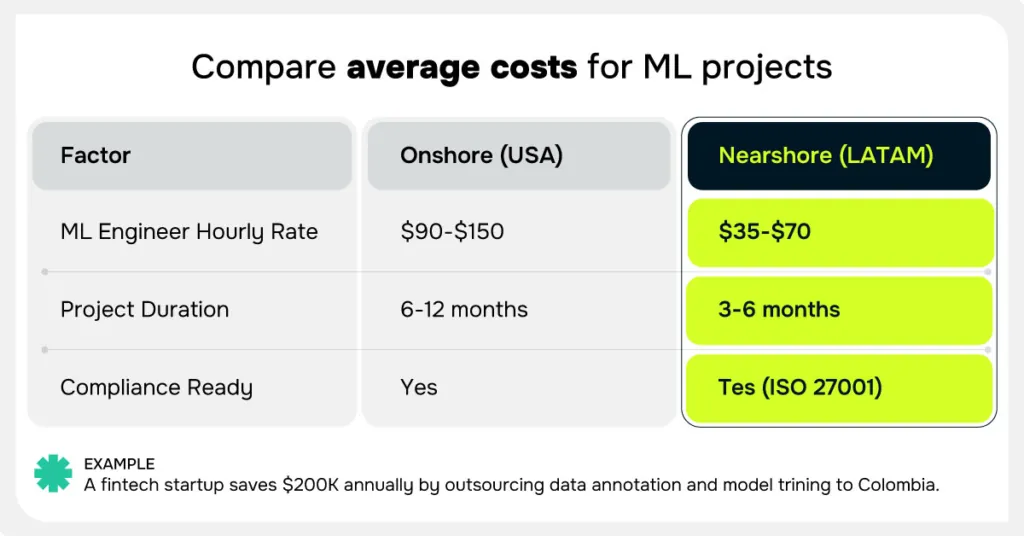Leveraging artificial intelligence and machine learning services through strategic machine learning outsourcing isn’t just about cutting costs—it’s about gaining a competitive edge that transforms business operations. By partnering with the right experts, businesses access specialized skills, accelerate innovation, and focus on core objectives while reducing operational expenses by up to 60%. However, success depends on choosing vendors with technical expertise, cultural alignment, and scalable solutions. This guide explores how to maximize benefits.
Key Takeaways
- Outsourcing machine learning enhances business operations by reducing costs, speeding up project timelines, and providing access to specialized global talent.
- Key benefits of machine learning outsourcing include cost efficiency, access to specialized expertise, and faster time to market, which collectively improve operational efficiency.
- Common challenges include data security concerns, communication barriers, and the difficulty of finding suitable outsourcing partners, all of which require careful management for successful outcomes.
Why machine learning outsourcing is a strategic move?
Top artificial intelligence and machine learning services providers deliver three game-changing advantages through machine learning outsourcing: major cost savings (up to 60%), instant access to global AI talent, and 2x faster product launches compared to in-house teams.
By partnering with these experts, you save time and speed up project delivery without sacrificing quality.Seasoned outsourcing firms help you achieve better results faster, turning complex challenges into scalable solutions.
Access to global talent means you get innovative, tech-driven approaches that are hard to replicate in-house. Outsourcing lets your team focus on core business goals while external experts handle the heavy lifting of AI development.
The result? Smarter decisions, sharper efficiency, and a stronger competitive edge—all without the overhead of building an in-house team.
Key benefits of machine learning outsourcing
Top-tier learning outsourcing companies deliver three game-changing advantages: major cost savings (up to 60%), instant access to global AI talent, and faster product launches. They eliminate the need for expensive in-house teams while providing cutting-edge tools and frameworks.
The perks go beyond budgets—outsourcing connects you with elite talent using cutting-edge tools, accelerating development while your team focuses on core business. Ready-made frameworks and dedicated external teams slash project timelines, helping you outpace competitors.
The result? Smarter tech, faster results, and a stronger market position—all with minimal overhead.

Cost savings of machine learning outsourcing to Latin America
Common challenges in machine learning outsourcing
While outsourcing machine learning brings big advantages, three key challenges need attention: data security risks, communication gaps, and finding the right partner.
Leaks of sensitive data can occur if providers don’t follow strict compliance standards. Time zone differences and language barriers often cause delays without proper communication plans in place.
Choosing the ideal nearshore partner requires checking technical skills, project experience, and cultural fit. The best providers combine geographic convenience with proven AI expertise and flexible collaboration styles.
With careful vetting and clear protocols, these hurdles become manageable – letting you focus on results rather than risks.
How to choose the best machine learning outsourcing vendor
When vetting providers of artificial intelligence and machine learning services, prioritize machine learning outsourcing partners with domain-specific case studies, compliance certifications, and cultural alignment with your workflows.
The best vendors combine technical certifications with cultural alignment to ensure seamless collaboration.
Assess technical expertise
Verify hands-on experience with your specific ML needs through case studies and certifications. The best vendors showcase proven success with similar projects and stay current with AI advancements.
Evaluate cultural compatibility
Time zone alignment and shared work values matter more than geography alone. Look for partners who adapt to your communication style and decision-making processes.
Consider financial aspects
Compare pricing models beyond hourly rates—factor in scalability, support costs, and infrastructure savings. True value comes from vendors who align costs with your growth trajectory.
The right outsourcing choice becomes a strategic advantage, combining specialized skills with seamless collaboration to accelerate your AI success.
Frequently asked about Machine Learning
What are the main benefits of outsourcing machine learning?
Outsourcing machine learning reduces costs (up to 60% savings), grants access to global AI talent and accelerates product launches.
It lets businesses focus on core operations while leveraging cutting-edge solutions. Nearshore options add cost efficiency without sacrificing quality.
How does outsourcing help with cost efficiency?
Companies avoid salaries, infrastructure costs, and training investments by outsourcing.
Nearshore partners in regions like Latin-American offer skilled labor at competitive rates. Flexible pricing models align expenses with project needs.
What challenges should businesses be aware of when outsourcing machine learning?
Data security risks require strict compliance with regulations like GDPR. Communication gaps can arise from time zones or language barriers—mitigate by choosing culturally aligned partners. Thoroughly vet vendors’ technical and project management skills upfront.
How do you choose the best machine learning outsourcing vendor?
Prioritize providers with proven certifications and relevant case studies. Ensure cultural compatibility for smoother collaboration. Start with a pilot project to test capabilities before full commitment. Prioritize providers offering free initial consultations, like Giga IT, to assess your needs before committing




0 Comments